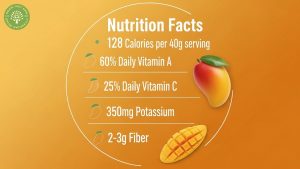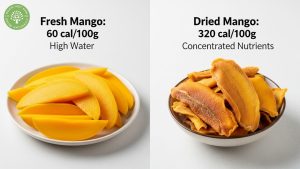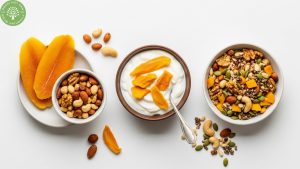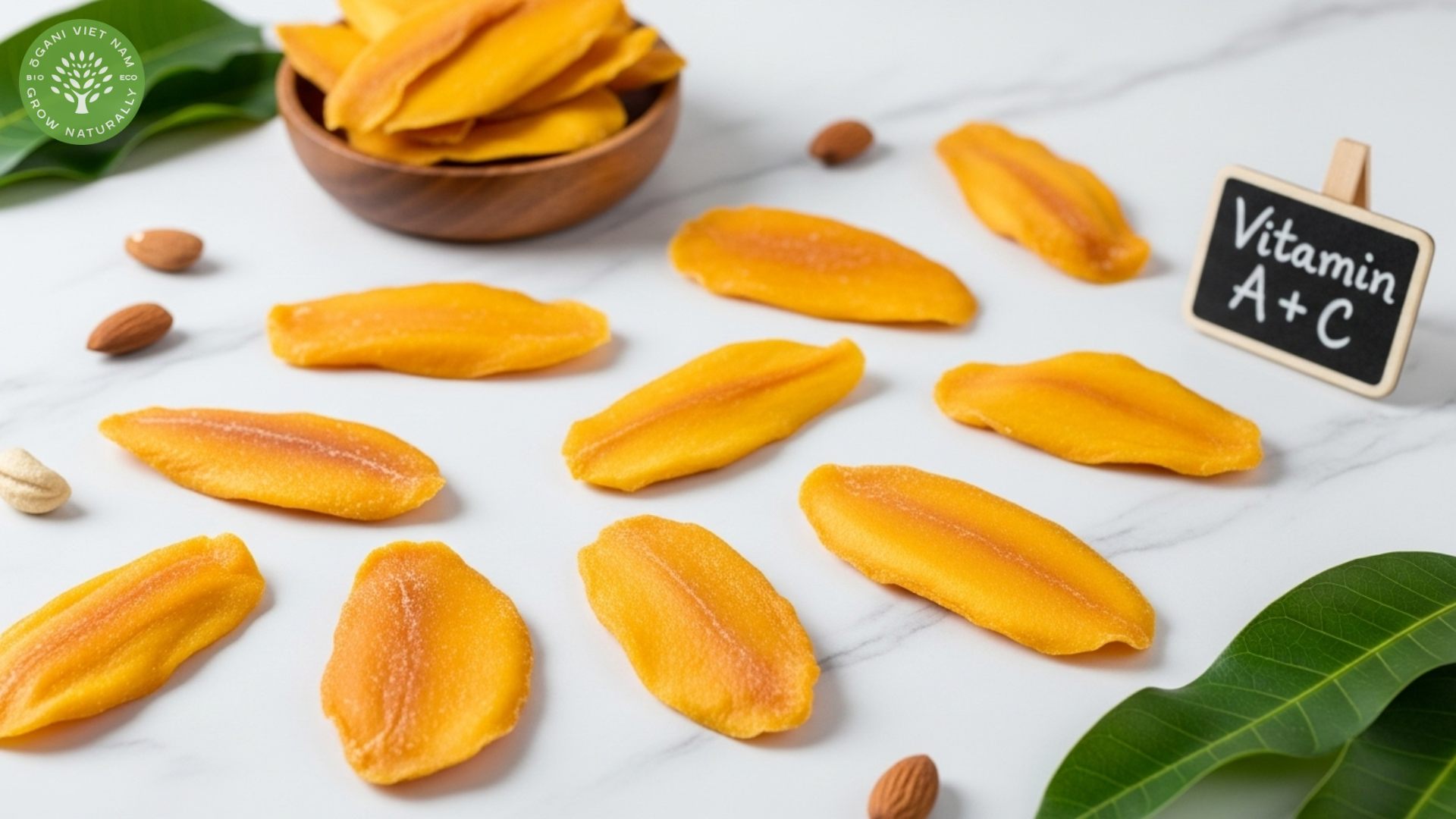Dried mangoes nutrition offers a concentrated source of vitamins, minerals, and natural sugars that can support your daily health goals. While these golden treats pack more calories than fresh mangoes due to water removal, they deliver impressive amounts of vitamin A, vitamin C, fiber, and potassium in every chewy bite.
At Ogani VN, we’ve seen countless customers discover the perfect balance between satisfying their sweet cravings and maintaining nutritional wellness through quality dried fruits. Let’s dive into what makes dried mangoes a smart addition to your diet.
Dried mangoes nutrition: essential nutrients breakdown

The nutritional profile of dried mangoes reveals why they’ve become such a popular healthy snack choice. A typical 40-gram serving contains approximately 128 calories, making them energy-dense yet manageable for portion control.
Dried mangoes nutrition shines particularly bright in the vitamin department. Each serving delivers about 60% of your daily vitamin A needs through beta-carotene, which your body converts to support eye health and immune function. You’ll also get roughly 25% of your daily vitamin C requirement, helping with collagen production and antioxidant protection.
The mineral content includes notable amounts of potassium (around 350mg per serving), which supports heart health and muscle function. Iron, calcium, and magnesium appear in smaller but still beneficial quantities. The fiber content, typically 2-3 grams per serving, aids digestive health while helping you feel satisfied longer.
What many people don’t realize is that the dehydration process concentrates these nutrients, meaning you get more vitamins and minerals per gram compared to fresh mangoes, though you’re also getting more natural sugars and calories in the process.
Dried mangoes nutrition: proven health benefits
Immune system support
The high vitamin C and beta-carotene content in dried mangoes creates a powerful one-two punch for your immune system. Vitamin C stimulates white blood cell production and helps your body fight off infections, while beta-carotene supports the integrity of mucous membranes that serve as your body’s first line of defense against pathogens.
We’ve noticed that customers who regularly include dried mangoes in their diet often report feeling more resilient during seasonal changes when immune challenges typically increase.
Eye health promotion
The beta-carotene in dried mangoes nutrition converts to vitamin A, which plays a crucial role in maintaining healthy vision. This nutrient helps prevent night blindness and may reduce the risk of age-related macular degeneration.
The antioxidant compounds, including lutein and zeaxanthin found in smaller amounts, provide additional protection against harmful blue light and oxidative stress that can damage retinal tissue over time.
Digestive wellness
Despite being dried, mangoes retain beneficial fiber that promotes healthy digestion. This fiber helps maintain regular bowel movements, feeds beneficial gut bacteria, and can help stabilize blood sugar levels by slowing the absorption of natural sugars.
The natural enzymes present in mangoes, though reduced during the drying process, still contribute to digestive efficiency and may help break down proteins more effectively.
Sugar content and caloric considerations

Let’s address the elephant in the room: dried mangoes are indeed high in natural sugars. A 40-gram serving contains approximately 20-25 grams of sugar, which represents about 50-65% of the total carbohydrate content.
However, this sugar comes packaged with fiber, vitamins, and minerals rather than being empty calories like refined sugar. The key lies in portion control and timing. We recommend enjoying dried mangoes as part of a balanced meal or paired with protein and healthy fats to minimize blood sugar spikes.
For those monitoring their sugar intake due to diabetes or weight management goals, consider limiting portions to 20-30 grams per serving and consuming them earlier in the day when your metabolism is most active.
The caloric density means that 100 grams of dried mangoes contain roughly 300-320 calories, compared to about 60 calories in 100 grams of fresh mango. This concentration makes dried mangoes excellent for hiking, travel, or post-workout snacking when you need quick energy.
Dried mangoes nutrition vs fresh: complete comparison

Fresh mangoes win in the water content department, naturally providing hydration alongside nutrients. They’re also lower in calories and sugar concentration, making them ideal for those watching their total caloric intake.
However, dried mangoes nutrition offers several unique advantages. The concentration process means you get more fiber per gram, making them more satisfying as a snack. The longer shelf life eliminates waste and provides consistent access to mango nutrition year-round.
Vitamin C levels actually remain quite stable during proper drying processes, though some heat-sensitive nutrients may decrease slightly. The trade-off often favors dried mangoes for convenience and nutrient density, while fresh mangoes excel for hydration and lower caloric impact.
From a practical standpoint, dried mangoes travel better, require no preparation, and satisfy sweet cravings more effectively than their fresh counterparts, making them invaluable for busy lifestyles.
Maximizing dried mangoes nutrition benefits

Smart consumption starts with reading labels carefully. Look for products with no added sugars, sulfites, or artificial preservatives. At Ogani VN, we always recommend choosing organic options when possible to minimize exposure to pesticide residues.
Portion control becomes crucial given the caloric density. Pre-portion servings into small containers or bags to avoid mindless overeating. A palm-sized portion (about 30-40 grams) makes an ideal snack size for most people.
Timing matters too. Consume dried mangoes when you can best utilize their natural energy – before workouts, during mid-morning energy dips, or as part of a balanced breakfast. Avoid eating them late at night when the natural sugars might interfere with sleep quality.
Pairing strategies can enhance both satisfaction and nutritional value. Try combining dried mangoes with nuts for protein and healthy fats, adding them to yogurt for probiotics, or including them in homemade trail mixes for sustained energy during outdoor activities.
Frequently Asked Questions
Q: How many dried mangoes can I eat per day? A: Most nutrition experts recommend limiting dried fruit to 1-2 servings daily, which equals about 30-60 grams of dried mangoes. This provides beneficial nutrients while keeping sugar and calories in check.

Q: Are dried mangoes good for weight loss? A: Dried mangoes can fit into a weight loss plan when consumed in moderation. Their fiber content promotes satiety, but the high caloric density requires careful portion control. They work best as occasional treats rather than daily staples during weight loss phases.
Q: Do dried mangoes have the same nutritional value as fresh ones? A: Dried mangoes concentrate most nutrients, providing more vitamins and minerals per gram but also more sugar and calories. Vitamin C remains largely intact, while some heat-sensitive nutrients may decrease slightly during processing.
Q: Can diabetics eat dried mangoes? A: People with diabetes can enjoy dried mangoes in small portions as part of a balanced meal plan. The key is monitoring blood glucose response and consulting with healthcare providers about appropriate serving sizes and timing.
Q: What’s the shelf life of dried mangoes? A: Properly stored dried mangoes last 6-12 months in a cool, dry place. Refrigeration can extend this to up to 18 months, while freezing maintains quality for 2-3 years.
Making dried mangoes nutrition work for your lifestyle
Dried mangoes nutrition offers a compelling combination of essential vitamins, minerals, and natural energy that can enhance your daily wellness routine when consumed thoughtfully. While their concentrated sugar and calorie content requires mindful portioning, the impressive vitamin A, vitamin C, and fiber content makes them a valuable addition to a balanced diet.
At Ogani VN, we’re committed to providing you with premium quality dried mangoes that retain maximum nutritional value while delivering the authentic tropical taste you love. Whether you’re seeking immune support, convenient portable nutrition, or simply a satisfying healthy snack, our carefully selected dried mangoes meet the highest standards for both taste and nutrition.
Ready to experience the nutritional benefits of premium dried mangoes? Browse our selection of organic, no-sugar-added dried mangoes and discover why thousands of health-conscious customers trust Ogani VN for their dried fruit needs. Visit our store today and take the first step toward enhancing your daily nutrition naturally.
Read more:
- Dried Mango Nutrition Facts: Complete Guide To Calories, Benefits & Health Impact
- Best Dried Mango No Sugar Added: Premium Quality Guide
- Calories In Dried Mango No Sugar Added: Complete Nutrition Guide
- Dried Mango Nutritional Value: Complete Health Guide
- Dried Mangoes Nutrition: Complete Health Benefits Guide


